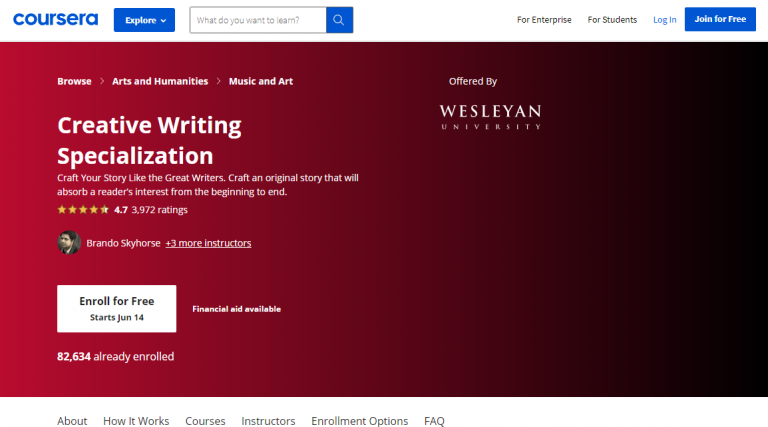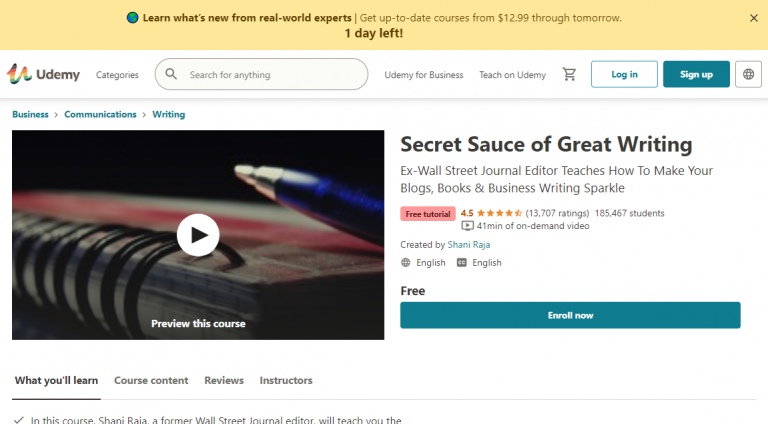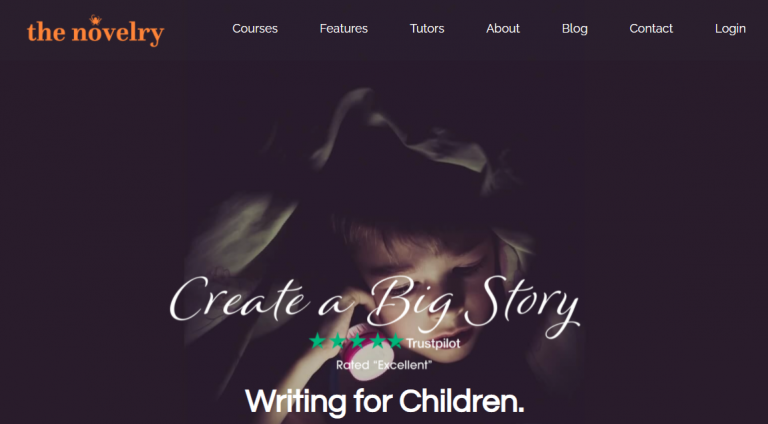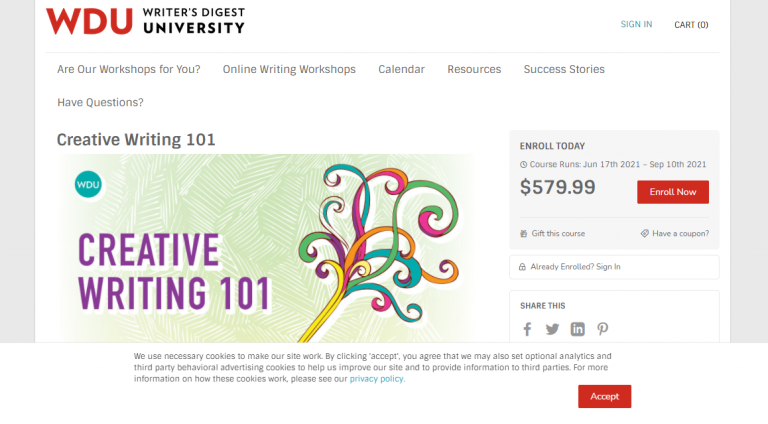Best Writing Courses
All topics are curated by you, the community. Free from editorial bias, 100% independent. Upvote your favorite items, propose missing ones and shape the ranking of this topic.
No matter what your level of writing proficiency is, there is always room for improvement. Whether you want to learn more about grammar, expand your vocabulary, or learn new writing techniques, there are a number of writing courses that can help you reach your goals.
As an aspiring writer, you might be looking for the best writing courses to take. There are many different types of writing courses available, so it’s important to choose the one that best fits your needs.
For example, if you want to learn how to write fiction, you should look for a course that focuses on that genre. On the other hand, if you want to learn how to write for businesses, you should look for a course that covers business writing.
To help you make the best decision, we’ve compiled a list of the best writing courses available. We’ve also included a brief description of each course so you can choose the one that’s right for you.
-
Craft Your Story Like the Great Writers. Craft an original story that will absorb a reader’s interest from the beginning to end. Offered By Wesleyan University.
About this Specialization
This Specialization covers elements of three major creative writing genres: short story, narrative essay, and memoir. You will master the techniques that good writers use to compose a bracing story, populated with memorable characters in an interesting setting, written in a fresh descriptive style. You will analyze and constructively evaluate peer writing. In the Capstone, you will draft, rewrite, and complete a substantial original story in the genre of your choosing.
Our courses are designed for anyone from the aspiring short story writer to established novelist. Whether you have a finished novel sitting on your desk calling for a fresh look or have had the germ of an idea for a decade, this Specialization gives you tools to achieve your goal. Through 4 courses focused on a key aspect of writing, and taken in any order you choose, you will develop a stronger ability to not only refine your writing, but critique writing in general and find inspiration in the works you are already reading.
Thanks to our sponsors, upon completion of their first assignment, learners in each course will receive up to an 80% discount from Write-Bros and a 30% discount off their first purchase from Scrivener to use on their writing software. Additionally, learners who complete an assignment will receive 30% off membership at the online writing community Scribophile. For more information about our partners, see the FAQ below.
Article from : https://www.coursera.org/specializations/creative-writing
-
Ex-Wall Street Journal Editor Teaches How To Make Your Blogs, Books & Business Writing Sparkle
What you'll learn:
In this course, Shani Raja, a former Wall Street Journal editor, will teach you the four ingredients of good writing: simplicity, clarity, elegance and evocativeness. After discovering how to add those ingredients skilfully, your writing will almost certainly begin to stand out from that of others in your field, profession or industry.
By the end of the course, you will have a good grasp of how good writers create powerful and beautiful prose. As a result, you'll also be able to quickly identify weaknesses in your writing and understand, in principle, how to fix and improve it dramatically.
Who this course is for:
The course will interest professionals keen to upgrade their writing skills to enhance their careers, or businesses that wish to sharpen up their corporate communications
Blog, book and business writers who want to craft their prose to make it look more slick and professional
Marketers, communications professionals and other copywriters.
Requirements
- A computer for doing writing and editing exercises
Article from: https://www.udemy.com/course/secret-sauce-of-great-writing/
-
Writing for children with world renowned authors.
Writing Children’s Books
Why do children’s books dominate the worldwide bestsellers lists of all time? What’s involved in writing a convincing child or teen protagonist that will appeal to younger and older readers? How do you bring a sense of wonder to your story? And how do you create a world young readers won’t want to leave?
If you’re looking for inspiration to create stories or already have an idea for a children’s book, and want to write with the guidance of world renowned children’s authors to get published, our team will help you shape and improve your book writing.
Our children’s book writing course is an award winning course rated best in the world by Intelligent – with five star reviews from writers too. (It’s the course recommended by the world’s leading literary agencies.)
Our children’s book course is a a year-long program with an easy 3 step process: 1. The Classic Course, 2. The Ninety Day Novel, 3. The Big Edit.
What’s more to ensure you stay on track, you’ll enjoy inspiring self paced interactive coursework, a thriving children’s writing community and one-to-one personal coaching.
You’ll write your children’s book with coaching from a bestselling children’s author, one of our team of children’s book authors writing for children of all ages, younger and older readers, who love helping aspiring writers with the creative process.
Our famous Classic Course is the perfect place to start writing in the children’s fiction genre and will give you a solid foundation to write books for children at all age levels, exploring books known for their place at the very top of the roster of the classic children’s books. You’ll learn world-building, character development, the hero’s journey, the importance of good versus evil, magic systems and much more. You’ll create a story young readers will love.
Our children’s book writing course program includes video lectures with guest appearances from famous names like Meg Rosoff, Piers Torday, Katherine Roundell and more and a treasure chest of carefully structured guidance to help you raise your word count daily, creating characters that will remain with children happily ever after. You’ll write quality children’s fiction with the wise guidance of successful children’s book writers who have won awards for their novels and picture books for younger readers and young adults.
Unlike other online courses, with our children’s writing course, we take you all the way to achieve your ambition to become a published author. You’ll go on to work with professionals from The Big 5 publishing houses like Penguin Random House, experienced as editors working in the children’s writing genre for every age group and when your book is ready we will introduce you to the children’s book market via submission to our literary agency partners.
It’s the combination of courses, coaching and community with dedicated expertise in writing for children, that makes this such a great course.
Article from: https://www.thenovelry.com/courses/childrens-books
-
Work with expert instructors to learn proven writing techniques to help you achieve your goals Get invaluable feedback on your writing from your instructor and/or fellow students This course does not include live class sessions. You’ll work through the lecture material on your own, with written assignments to be turned in to your instructor for feedback.
Overview:
Are you one of those people who have thought, “I’d like to write a book someday, but I don’t know where to start”? If yes, then this is the course for you. All you need is to open yourself up and allow your ideas to flow, plus a writing implement to capture those ideas.
You may have hesitated to start writing your story before because of confusion about what to say, where to start writing, and how to shape your ideas. That should no longer be an issue. Let’s start by saying that there is no wrong way to write. While there are lots of tools to help with writing, as well as a plethora of methods and books, you should focus on what works for you. Use whatever method of writing is comfortable, motivating, and inspiring. Make your writing routine as simple and as convenient as you can.
However, there are a few key elements of good storytelling to learn that help the writer develop the story and meet the expectations of the reader. A good story also contains strong character development. The protagonist is the key to every story—who your protagonist is, what the protagonist wants, and the enemy the protagonist is fighting against. It is important to create a character that you want to get to know and look forward to writing—a character that your audience will care about what happens to him or her. Writing interesting characters is half the battle, which is won by learning how to get to know your character.
Creative Writing 101 combines teaching the key elements of storytelling with developing the protagonist. Once you understand who this character is and how to make sure you’ve included the key story elements, you are well on your way to writing that book you have been squelching.
Course Outline
Session One: Who is the story about?
- It is important to establish your lead character—known as your protagonist—as the person the story focuses on and to create a character that your audience will want to follow. How do you create compelling characters?
Session Two: What is the protagonist’s goal?
- Every story needs a goal for the audience to measure how the story is progressing by whether the protagonist is successful or failing to achieve that goal. What does the protagonist want? How is he trying to obtain what he wants? Does what he want change as the story progresses? What is at stake for the protagonist if she fails? How do you create a sense of urgency?
Session Three: What is the protagonist’s problem?
- Every story needs a conflict or a problem that the protagonist is trying to resolve. Sometimes the conflict is what is standing in the way of the protagonist reaching their goal, or sometimes the goal is to overcome the problem? What is the conflict for the protagonist in your story? How do you make this a life and death issue?
Session Four: Who is the antagonist?
- The main person your protagonist is at odds with is your antagonist. Who is your protagonist fighting against?Does the antagonist have to be a person? Who or what is creating obstacles for your protagonist? Who or what is trying to thwart your protagonist from achieving his goal?
Session Five: How do you create obstacles for the protagonist?
- One of the most difficult sections to write is the middle act in which the hero of the story has to overcome obstacles to solve the problem and achieve their goal. How do you create obstacles to move the story forward and keep your audience interested? What are plot points? How do you choose the best climax for the story?
Session Six: What is the story really about?
- The best stories have a cohesive theme that the audience identifies with. A theme is an idea or a moral or a value that your story is trying to explore. Themes are usually a phrase of a few words such as: “love is the greatest power on earth,” “courage overcomes fear,” “revenge is bittersweet.” The theme helps the writer to stay focused on writing a story that makes sense, leads somewhere, and has a point. How do you know what your story is about?
Session Seven: How do you choose a Point of View (POV)?
- Stories can be told from different character’s perspectives. The story can also be told by the character using “I” or from another source using “she” and “he.” The person telling the story may know everything, may know some things, or may only know what is personally heard and experienced. How do you know whose perspective to use? How do you know which POV to use?
Session Eight: How Do you make Dialogue Interesting and Descriptions Visual?
- There are several ways a writer gets tripped up creating dialogue. For one, the dialogue often starts out flat or there is too much or who said what gets lost. Descriptions can be overwritten creating muddy or confused images in the reader’s mind. How do you write dialogue that is engaging and descriptions that show the story?
Session Nine: How does the story end?
- The ending is often the most memorable section of the story and determines whether the audience will remember the story favorably or see it as so-so or even a failure. What does a good story ending need to satisfy the reader? How do you tie the story up quickly once the climax has occurred?
Session Ten: Where should your story begin?
- A beginning should always set the tone and voice of the story, but a story doesn’t always start at the beginning. Where is the best place to start the story? How do you crowd all the details the story initially needs into the opening? How do you hook the reader?
Session Eleven: What is the best order for writing the story?
- A story should be written as the ideas come. Organizing the story is sometimes a natural linear progression and at other times it is organizing the story by the dynamics and the tension. How do you know what goes where? How do you use tension and pacing to better tell the story? How do you use plot to structure your story? How do you find the holes in the story?
Session Twelve: What supplies the motivation to finish writing the story?
- Stories take creativity, thought, emotional stress, and work to be dynamic. Where do these come from? How does a writer sustain the pain of writing a story to the joy of completing it? How do you use this information to stay focused on the story path you want to write without undue influence by outside criticism?
What You'll Learn
- How to develop a more vibrant protagonist
- How to set a goal for your protagonist
- How to define the protagonist’s problem
- How to define who is the antagonist
- How to create obstacles
- How to define what your story is really about
- How to choose a point of view
- How to write good dialogue
- How to be more visual
- How to create the hook and the ending
- How to determine the best order to tell your story
- How to find the discipline to keep writing
Who Should Take This Course
- Students new to writing who are unsure where to begin
- Individuals who want a refresher on the key elements of writing
- Fiction writers who want to learn more about character development
- Writers who want to work on imagery and dialogue
Article from: https://www.writersonlineworkshops.com/courses/creative-writing-101
-
Learn To Translate Your Experiences Into A Memoir That Captivates Readers
CLASS DESCRIPTION
Everyone’s got a story to tell. Some are funny. Some are inspiring. Others are tragic. But no matter how compelling your story might seem, it won’t resonate with readers unless you’re able to effectively translate your concept onto the page.
Celebrated journalist, novelist and memoirist Joyce Maynard will give you the tools you need to transform your brilliant idea into an absorbing memoir that readers won’t be able to put down.
Maynard will begin by walking you through the process of identifying your story and how best to tell it. She’ll then help you develop your story through language, story structure, dramatic tension, dialogue, description and editing. Finally, she’ll address the challenges of the writing life, such as how to create a productive practice, design a comfortable writing space, deal with rejection and find an audience.
In this class, you’ll learn how to:
- Understand the difference between telling what happened and exploring your journey.
- Figure out what to include in your story and what to cut out.
- Decide on a point of view, a point of entry and a structure.
- Get over your fears of revealing embarrassing truths about yourself.
- Stop worrying about being judged.
- Deal with loneliness and find your tribe.
- Develop the arc of a sentence, a paragraph and a story.
- Listen to the sound and rhythm of your sentences.
Article from : https://www.creativelive.com/class/writing-your-story-joyce-maynard
-
Empower yourself with indispensable skills for better writing and editing.
What's included in your course:
- 100+ lessons (Get ready to read, the best way to learn about English grammar!)
- 23 quizzes (Self-assess throughout your course so you'll know where you're strong and what still needs work.)
- skill-building assignments (Everybody needs practice, and Grammar Lion makes it fun.)
- 24/7 course access (Enjoy 12 weeks of course time. During these weeks, go at your own pace through 12 chapters of grammar lessons.)
- one-to-one instructor support (Ask questions through the course discussion forum or private email and get a reply within one business day.)
- incredible resources (Download a PDF full of invaluable grammar resources.)
- ongoing access to your instructor (The learning continues when your course time ends—stay in touch via email or Grammar Lion on Facebook.)
Here's a sampling of what you'll learn:
- homophones and other mixed-up words
- contractions and possessives
- sentence fragments and run-on sentences
- standard verb forms in simple and complex tenses
- agreement between subjects and verbs, and pronouns and antecedents
- clarity, concision, and logic
- capitalization and punctuation
Article from: https://www.grammar-lion.com/courses/grammar-lion-a-grammar-refresher
-
Fiction Writing
Fiction Writing
Fiction is a wonderful conjuring act. With only words and the reader’s imagination, a work of fiction can sail across the world in pursuit of a whale, or time-travel to another dimension, or zero in on a few minutes in line at the local bank, enveloping the reader in a made-up story that feels real.
To pull off this feat requires a balance of craftsmanship, daring, and insight into human nature. Here you will learn the time-tested elements of fiction craft and how to market your work.
Whether you seek to write short stories or novels, mainstream or literary, comic or tragic, we’ll show you how to spin your thoughts into believable and spellbinding tales.
Notes
Fiction I encompasses short stories and novels. After Level I, students have a choice of Fiction II/III (focusing on short stories), or Novel II/III (focusing on novels).
If you are working on “genre” fiction, you may take either a Fiction/Novel course or one of our genre courses: Science Fiction & Fantasy, Romance, Mystery.
If you are working on a YA novel, you may take a Fiction/Novel or “genre” course, or you may take a Children’s Book course, where the full spectrum of children’s books will be covered.
Article from: https://www.writingclasses.com/classes/description/fiction-writing






